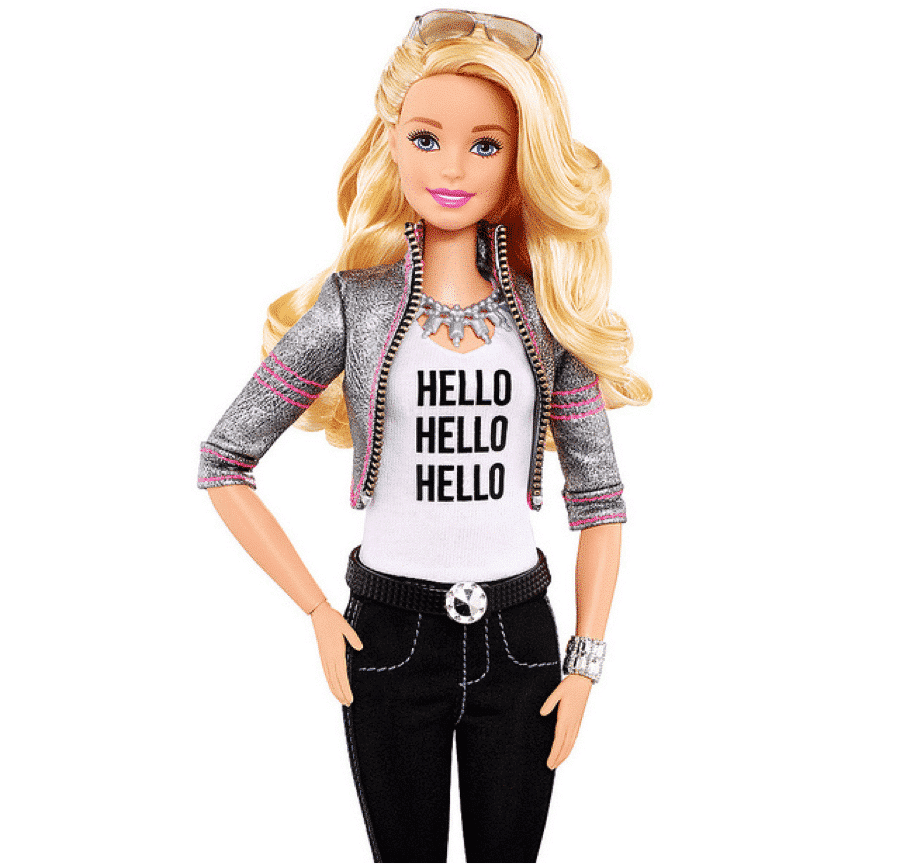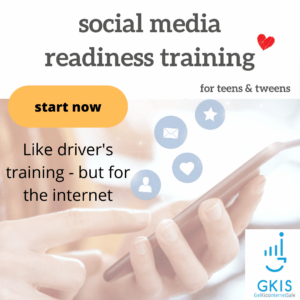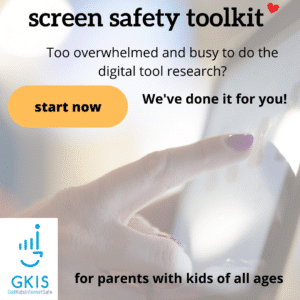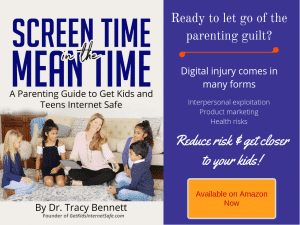
In 2015, Mattel released the smart toy Hello Barbie. Hello Barbie looks like any other Barbie, but this one can carry on a conversation with your child. With Barbie’s artificial intelligence, she listens to (as in records and processes) your child’s voice when you push her belt buckle. Then she responds with one of 8,000 pre-recorded responses. What could possibly go wrong?
Here are the 6 ways I think your HELLO Barbie can go way wrong:
PROFILING: A company may not be trustworthy. What is to stop them from profiling your child’s play behaviors and interests and protect that information?
While your child is playing with Hello Barbie, not only is their voice recorded and stored in the cloud somewhere, but their content is being analyzed for a response. Kids babble about the weirdest and sometimes most embarrassing things. Do you want strangers to have access to hours of unfiltered babbling from your child?
Also, what exactly will Mattel do with that recorded information? Will it help them target their marketing toward your family? Will they be forced to turn the information over to law enforcement if your child reveals information suggestive of abuse or danger? Will the FBI end up at your door because your child said what sounded like “bomb” Tuesday after school?
We’ve come to accept that companies are allowed to view our spending habits from our Target cards…and on Facebook…but we must draw the line at our children’s bedrooms. Don’t we?
CYBERSECURITY: Even the most secure servers get hacked. Can Mattel protect the information they collect from bad actors online?
Maybe you consider Mattel trustworthy to have your private information. But once the information is saved on their servers, your child’s content and even speech pattern footprint are there for the taking.
Today a speech pattern may seem harmless to analyze. But we now know that ultrasound photos that were harmlessly posted online several years ago can now be analyzed to reveal far more information about an unborn baby than we once imagined. The same futuristic analysis with unknown impact may emerge from data gathered from your child.
PRIVACY: Does a child deserve to have privacy during play? Or is it OK for parents to access data about every word they (and those around them) utter when they thought they were alone?
One of the foundations of GetKidsInternetSafe is supporting a trusting, warm connection between parent and child. Even with online filtering and monitoring, kids will still need to independently deal with difficult online situations.
What will it mean to your child when they consider that mom or dad listened to every word said to their BFF Hello Barbie? Maybe it won’t mean much to them at 6 years old, but it may mean far more when they share the story at 16 years old. Spying sets an unhealthy precedent and undermines trust. Barbie has no business getting between you and your child.
BRANDING: Not only will Barbie be reinforcing the Barbie brand, but she’ll also make suggestions about what your child should think about and who your child should be.
Stephen Balkam, executive director of the Family Online Safety Institute (FOSI), once told me that his Hello Barbie remembered their conversation days earlier. He told her he considered becoming a doctor when he was younger. She then asked if he had considered working in the fashion industry! I was all, “That’s not OK!” Not that I have anything against the fashion industry, but I fail to see how Hello Barbie is qualified to give job advice to a vulnerable, Barbie-adoring child.
And what happens if Barbie mentions another toy or movie? Branding, that’s what happens. Imagine the dollars Mattel will bring in with that corner on your child’s pester power.
DAUGHTER SHAMING. Barbie has been a contributor to American women feeling terrible about their bodies, now she can make us feel terrible about our interests and dreams too.
Barbie has been a significant contributor to body shame for women all over the world for decades. Her head is too large, her neck and legs are too long, her feet and wrists are too tiny, and her waist is freakishly slim. Where are her hips?
It turns out that if a woman had Barbie’s body, she’d have to give up some critical internal organs. If we can’t trust Mattel with our fragile daughters’ body images, do we want her modeling conversation and interests?
BABYSITTING. Barbie is an object, not a family member. One thing psychologists agree on is the importance of the human-to-human relationship.
We long to be together from the day we are born. Our popular music, poetry, literature, movies, and television revolves around love and romance. Kids are no different. They thrive under the adoring eyes of their parents, family, and friends.
It is dangerous to farm that critically important job out to robots. Barbie’s blank-eyed stare is not what children need to learn important social skills like attentiveness and empathy or that the world is trustworthy and cares. Come to think of it, Hello Barbie’s eyes say the very opposite.
I’m the mom psychologist who will help you GetKidsInternetSafe.
Onward to More Awesome Parenting,
Tracy S. Bennett, Ph.D.
Mom, Clinical Psychologist, CSUCI Adjunct Faculty
GetKidsInternetSafe
Photo Credit
3042430-inline-s-1-hello-barbie-talking-toy-toytalk by POMAH Magician, CC by-NC 2.0
Don't worry, we will never spam you.










